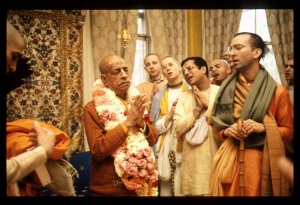CC Madhya 1.55 (1975): Difference between revisions
(Vanibot #0027: CCMirror - Mirror CC's 1996 edition to form a basis for 1975) |
(Vanibot #0020: VersionCompareLinker - added a link to the Version Compare feature) |
||
| Line 2: | Line 2: | ||
<div style="float:left">'''[[Sri Caitanya-caritamrta (1975)|Śrī Caitanya-caritāmṛta (1975)]] - [[CC Madhya (1975)|Madhya-līlā]] - [[CC Madhya 1 (1975)|Chapter 1: The Later Pastimes of Lord Śrī Caitanya Mahāprabhu]]'''</div> | <div style="float:left">'''[[Sri Caitanya-caritamrta (1975)|Śrī Caitanya-caritāmṛta (1975)]] - [[CC Madhya (1975)|Madhya-līlā]] - [[CC Madhya 1 (1975)|Chapter 1: The Later Pastimes of Lord Śrī Caitanya Mahāprabhu]]'''</div> | ||
<div style="float:right">[[File:Go-previous.png|link=CC Madhya 1.54 (1975)|Madhya-līlā 1.54]] '''[[CC Madhya 1.54 (1975)|Madhya-līlā 1.54]] - [[CC Madhya 1.56 (1975)|Madhya-līlā 1.56]]''' [[File:Go-next.png|link=CC Madhya 1.56 (1975)|Madhya-līlā 1.56]]</div> | <div style="float:right">[[File:Go-previous.png|link=CC Madhya 1.54 (1975)|Madhya-līlā 1.54]] '''[[CC Madhya 1.54 (1975)|Madhya-līlā 1.54]] - [[CC Madhya 1.56 (1975)|Madhya-līlā 1.56]]''' [[File:Go-next.png|link=CC Madhya 1.56 (1975)|Madhya-līlā 1.56]]</div> | ||
{{CompareVersions|CC|Madhya 1.55|CC 1975|CC 1996}} | |||
{{RandomImage}} | {{RandomImage}} | ||
==== TEXT 55 ==== | ==== TEXT 55 ==== | ||
| Line 11: | Line 10: | ||
<div class="verse"> | <div class="verse"> | ||
:seita parāṇa-nātha pāinu | :seita parāṇa-nātha pāinu | ||
:yāhā | :yāhā lāgī' madana-dahane jhuri genu | ||
</div> | </div> | ||
| Line 18: | Line 17: | ||
<div class="synonyms"> | <div class="synonyms"> | ||
seita—that; parāṇa-nātha—Lord of My life; pāinu—I have gotten; yāhā—whom; | seita—that; parāṇa-nātha—Lord of My life; pāinu—I have gotten; yāhā—whom; lāgi'-for; madana-dahane—in the fire of lusty desire; jhuri—burning; genu—I have become. | ||
</div> | </div> | ||
| Line 25: | Line 24: | ||
<div class="translation"> | <div class="translation"> | ||
"I have gotten that Lord of My life for whom I was burning in the fire of lusty desires." | |||
</div> | </div> | ||
| Line 32: | Line 31: | ||
<div class="purport"> | <div class="purport"> | ||
In Śrīmad-Bhāgavatam ([[SB 10.29.15]]) it is stated: | In Śrīmad-Bhāgavatam ([[SB 10.29.15|10.29.15]]) it is stated: | ||
:kāmaṁ krodhaṁ bhayaṁ sneham aikyaṁ sauhṛdam eva ca | :kāmaṁ krodhaṁ bhayaṁ sneham | ||
:nityaṁ harau vidadhato yānti tan- | :aikyaṁ sauhṛdam eva ca | ||
:nityaṁ harau vidadhato | |||
:yānti tan-mayatām hi te | |||
The word kāma means lusty desire, bhaya means fear, and krodha means anger. If one somehow or other approaches Kṛṣṇa, his life becomes successful. The gopīs approached Kṛṣṇa with lusty desire. Kṛṣṇa was a very beautiful boy, and they wanted to meet and enjoy His company. But this lusty desire is different from that of the material world. It appears like mundane lust, but in actuality it is the highest form of attraction to Kṛṣṇa. Caitanya Mahāprabhu was a sannyāsī; He left home and everything else. He could certainly not be induced by any mundane lusty desires. So when He used the word madana-dahane ( | The word kāma means lusty desire, bhaya means fear, and krodha means anger. If one somehow or other approaches Kṛṣṇa, his life becomes successful. The gopīs approached Kṛṣṇa with lusty desire. Kṛṣṇa was a very beautiful boy, and they wanted to meet and enjoy His company. But this lusty desire is different from that of the material world. It appears like mundane lust, but in actuality it is the highest form of attraction to Kṛṣṇa. Caitanya Mahāprabhu was a sannyāsī; He left home and everything else. He could certainly not be induced by any mundane lusty desires. So when He used the word madana-dahane ("in the fire of lusty desire"), He meant that out of pure love for Kṛṣṇa He was burning in the fire of separation from Kṛṣṇa. Whenever He met Jagannātha, either in the temple or during the Ratha-yātrā, Caitanya Mahāprabhu used to think, "Now I have gotten the Lord of My life and soul." | ||
</div> | </div> | ||
Latest revision as of 05:30, 27 January 2020

A.C. Bhaktivedanta Swami Prabhupada
TEXT 55
- seita parāṇa-nātha pāinu
- yāhā lāgī' madana-dahane jhuri genu
SYNONYMS
seita—that; parāṇa-nātha—Lord of My life; pāinu—I have gotten; yāhā—whom; lāgi'-for; madana-dahane—in the fire of lusty desire; jhuri—burning; genu—I have become.
TRANSLATION
"I have gotten that Lord of My life for whom I was burning in the fire of lusty desires."
PURPORT
In Śrīmad-Bhāgavatam (10.29.15) it is stated:
- kāmaṁ krodhaṁ bhayaṁ sneham
- aikyaṁ sauhṛdam eva ca
- nityaṁ harau vidadhato
- yānti tan-mayatām hi te
The word kāma means lusty desire, bhaya means fear, and krodha means anger. If one somehow or other approaches Kṛṣṇa, his life becomes successful. The gopīs approached Kṛṣṇa with lusty desire. Kṛṣṇa was a very beautiful boy, and they wanted to meet and enjoy His company. But this lusty desire is different from that of the material world. It appears like mundane lust, but in actuality it is the highest form of attraction to Kṛṣṇa. Caitanya Mahāprabhu was a sannyāsī; He left home and everything else. He could certainly not be induced by any mundane lusty desires. So when He used the word madana-dahane ("in the fire of lusty desire"), He meant that out of pure love for Kṛṣṇa He was burning in the fire of separation from Kṛṣṇa. Whenever He met Jagannātha, either in the temple or during the Ratha-yātrā, Caitanya Mahāprabhu used to think, "Now I have gotten the Lord of My life and soul."